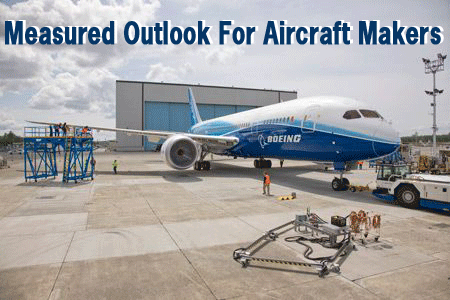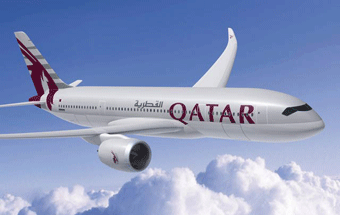

Right on top of this being
the week The Paris Air Show at LeBourget Field in Paris, an expo extraordinaire
celebrates it’s 100th anniversary, comes the unusual news that
the big two heavyweight commercial aircraft builders,  Boeing
and Airbus were only able to announce two dozen aircraft sales in total
with Airbus getting two dozen from Qatar and Boeing getting stiffed
completely, selling zilch.
Boeing
and Airbus were only able to announce two dozen aircraft sales in total
with Airbus getting two dozen from Qatar and Boeing getting stiffed
completely, selling zilch.
Maybe worse are some whispers about Boeing’s
much delayed Dreamliner that in some quarters has turned into direct
confrontation.
But as everybody keeps saying—it’s
been that kind of year.
The global recession is weighing heavily
on commercial aerospace manufacturers and their suppliers. Materially
reduced air travel has resulted in a sharp drop in aircraft orders and
a cloudy outlook for deliveries, reversing a strong market upturn in
recent years.
Business prospects worsened considerably
in recent months for commercial aerospace manufacturers and their suppliers.
A deepening global recession, declining air traffic, capacity cuts by
airlines, and reduced availability of financing for aircraft purchases
signal uncertain conditions for the sector. In this climate, demand
for jetliners has dropped significantly and orders in 2009-2010 will
be much lower compared with strong levels in 2005-2007 and most of 2008.
Still, analysts expect 2009 may not be
so bad for the two large aircraft manufacturers—Boeing Co. and
Airbus SAS, a unit of European Aeronautic Defense And Space Co. N.V.
because they still have robust backlogs, which should lead to higher
combined deliveries this year. But the outlook for 2010 is more uncertain:
Deliveries are likely to decline because as stated previously air travel
has slowed considerably worldwide and some financially troubled airlines
have deferred or cancelled orders, while others may also take this approach.
By contrast, before turmoil in the financial markets and the ensuing
economic weakness, it was expected the strong cyclical commercial aerospace
upturn would last until 2011.
The recession has also hurt companies
providing replacement parts and services—a generally higher-margin
business—because airlines are cutting capacity (or slowing capacity
growth) in response to the lower demand for air travel. Thus, both aircraft
manufacturing and the aftermarket are currently in a downturn.
Another segment of commercial aviation,
the business jet market, has weakened sharply in recent months, because
of the global recession, lower corporate profits, the upheaval in the
capital markets, reduced availability of financing, and increased proportion
of attractively priced used planes on the market. In addition, some
are viewing the use of corporate aircraft unfavorably in the current
economic climate.
In view of these conditions, expect the
commercial aerospace sector's credit quality to come under some pressure
in 2009-2010. About 75% of issuers still have stable outlooks (compared
with about 85% in December 2008), partly because of the fairly steady
defense operations of many companies. Meaningful credit quality improvements
achieved in recent years started to reverse in the last three months
of 2008; this trend continued in the first months of 2009.
No one was happy with Boeing's announcement
that it will be reducing production or delaying production increases
on certain wide body aircraft next year and will be taking a related
charge in the first quarter of 2009.
The previous sharp cyclical civil aviation
market downturn was seriously exacerbated by the Sept. 11, 2001, terrorist
attacks and other shocks, such as the severe acute respiratory syndrome
(SARS) outbreak and the Iraq war. In contrast, the commercial aerospace
industry entered the current recession with much higher and more diversified
backlogs. Backlogs at Boeing and Airbus, while no longer at record levels
due to minimal orders in recent months, remain sizable, worth an exceptionally
long seven years of current production. In addition, the orders have
broad geographic and customer diversity, with mostly weak U.S. airlines
accounting for only about 10% of the total.
The current backlog is over 7,000 planes,
split about evenly between Boeing and Airbus, compared with 2009 likely
deliveries of 950-1,000 units, with Boeing at 480-485 (375 in 2008,
in part due to the eight-week machinists' strike last fall) and Airbus
at 475-500 (a record 483 in 2008). If they achieve these levels, it
would mark a new industry record, exceeding 914 units in 1999. However,
a portion of the backlog is vulnerable, with increasing deferrals and
cancellations in recent months. During the last severe industry downturn
from 2001 to 2003, deferrals and cancellations affected about 25% of
the backlog. If order deferrals and cancellations follow a pattern similar
to what occurred in 2001-2003, the effect on deliveries would be material,
but they should still be higher than those in the last downturn. A near-term
mitigating factor could come from other customers wishing to accelerate
their deliveries of new, fuel-efficient planes, taking the place of
airlines seeking to cancel or defer deliveries.
Historically, aircraft orders have shown
a high correlation with airline earnings, making that a key factor in
the commercial aerospace sector's prospects. The global airline industry,
as a whole, was unprofitable in 2008 (following 2007, the most profitable
year since 2001), mostly because of high jet fuel prices and a deteriorating
economy, which hit U.S. carriers hardest. About 30 smaller U.S. and
foreign carriers have gone out of business in 2008, and many others
have reported poor financial performance.
The airline industry has taken steps to
better position itself for an economic slowdown, including extensive
cost reductions, capacity cuts through retirement of older aircraft
and schedule changes, selected fare increases, and imposing various
fees. Also helping has been the significant fall in oil prices to about
$70 per barrel from more than $145 per barrel in July 2008. However,
the worsening recession, tighter corporate travel budgets contributing
to further reductions in air traffic (which fell more than 5% in recent
months, a rare phenomenon historically), and a tough competitive environment
are outweighing the fuel benefit and are likely to cause losses for
most airlines in 2009.
Although arrangements are in place (or
being arranged) for most deliveries scheduled in 2009, many are concerned
about reduced availability for financing aircraft in 2010. Among the
lending sources likely to scale back or that are not viable now are
major traditional capital providers, such as commercial banks (about
40% of the total financing), especially those in Europe; leasing companies;
and the public debt markets. Accordingly, expect other players, particularly
export credit agencies, such as the U.S. Export-Import Bank and its
European counterparts, to become more active in the market. Also, aircraft
and engine manufacturers will likely face renewed pressure to offer
customer financing for their products, something they did not have to
do in recent years.
Expect Boeing Capital to materially increase
customer financing in 2009-2010. Expect Airbus to provide more aircraft
financing. New sources of financing could emerge over time, because
popular new-technology planes, which are more fuel efficient than previous
models, are still considered good collateral. Overall, analysts are
concerned about the availability of aircraft financing, but this is
probably of lesser importance than the impact of the recession on air
traffic, and financial pressures on airlines.
Commercial aerospace suppliers’
efforts to streamline operations, properly size capacity, trim inventory,
and maintain a low cost position have paid off, as improving financial
results in recent years demonstrate. Despite increased efficiency, however,
several factors, in addition to the Boeing strike and its aftermath,
have strained the supply chain, including rising aircraft production
rates, new programs, the two-year delay on Boeing's new 787 jetliner,
tight availability of some key raw materials, and the effect of the
credit crunch on some suppliers, especially the ones with limited financial
resources and business diversity.
At the same time, suppliers increasingly
have to invest more money to participate on new aircraft programs. For
example, Boeing's manufacturing approach for its 787 focuses on overall
design and final assembly, while outsourcing design and manufacture
of almost all systems. This strategy has increased both opportunities
and risks for suppliers, and it has weakened credit quality in some
cases due to the substantial upfront investment required. Airbus also
intends to increase outsourcing for its A350 XWB, a competitor to the
787 scheduled to enter service in 2013, and has already awarded major
contracts to key suppliers.
Gordon Feller



